| Srl | Item |
| 1 |
ID:
128693
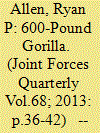

|
|
|
| 2 |
ID:
185912


|
|
|
|
|
| Summary/Abstract |
In this article, Keith Dear argues that demographic and geographic constraints on national power are reducing in two ways. First, that automation, robotics and AI reduce states’ dependence on people to create wealth and to scale military forces to deter or fight. Second, while geography was once the only arena for international competition, today, economic, military and political contests increasingly extend to the digital metaverse. He argues that we are moving beyond the ‘geo’ in geopolitics, witnessing the digital transformation of power.
|
|
|
|
|
|
|
|
|
|
|
|
|
|
|
|
| 3 |
ID:
130105
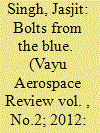

|
|
|
| 4 |
ID:
113157
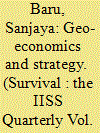

|
|
|
|
|
| Publication |
2012.
|
| Summary/Abstract |
Geo-economics may be defined in two different ways: as the relationship between economic policy and changes in national power and geopolitics (in other words, the geopolitical consequences of economic phenomena); or as the economic consequences of trends in geopolitics and national power. Both the notion that 'trade follows the flag' (that the projection of national power has economic consequences) and that 'the flag follows trade' (that there are geopolitical consequences of essentially economic phenomena) point to the subject matter of geo-economics.
|
|
|
|
|
|
|
|
|
|
|
|
|
|
|
|
| 5 |
ID:
127745
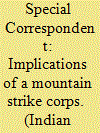

|
|
|
|
|
| Publication |
2014.
|
| Summary/Abstract |
China's past history is laced with aggression and blatant disregard to world opinion. The PLA is well ahead of the Indian Army and this ever-widening gap, if not checked and bridged, will catapult Chinese adventurism. We should expect no respite from increasing Chinese pressure. China-Pakistan are hand in glove in waging asymmetric war against India and the situation is likely to get increasingly volatile inadvertently egged on by US-China and US-Pakistan equations and heightened Chinese aggressive posture. India needs to be prepared for a Chinese thrust into Arunachal Pradesh. We should have the capacity to thwart that and go for North Tibet employing not just the Mountain Strike Corps but all elements of national power.
|
|
|
|
|
|
|
|
|
|
|
|
|
|
|
|
| 6 |
ID:
058377
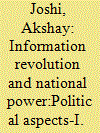

|
|
|
| 7 |
ID:
058396
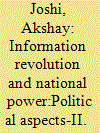

|
|
|
| 8 |
ID:
066934
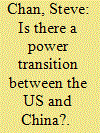

|
|
|
| 9 |
ID:
177853


|
|
|
|
|
| Summary/Abstract |
Is Vladimir Putin’s Russia rising, stagnating or falling? Contradictory views on the dynamics of Russia’s national power inform policies and decisions with strong and lasting effects on international affairs and global security. The authors used three existing quantitative methods of measuring national power and introduced one experimental method to measure Russia’s national power and compare it with that of the leading Western states, BRICS members, former Soviet republics and oil-dependent economies. All methods demonstrated that Russia was rising against its Western competitors in 1999–2016 but trailed behind the United States, China and India in absolute national power value, though, whether Russia would be able to maintain that dynamic beyond that period was doubtful.
|
|
|
|
|
|
|
|
|
|
|
|
|
|
|
|
| 10 |
ID:
170071
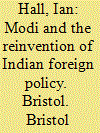

|
|
|
|
|
| Publication |
Bristol, Bristol University Press, 2019.
|
| Description |
xiii, 221p.pbk
|
| Standard Number |
9781529204629
|
|
|
|
|
|
|
|
|
|
|
|
Copies: C:1/I:0,R:0,Q:0
Circulation
| Accession# | Call# | Current Location | Status | Policy | Location |
| 059803 | 327.54/HAL 059803 | Main | On Shelf | General | |
|
|
|
|
| 11 |
ID:
126463
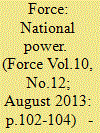

|
|
|
|
|
| Publication |
2012.
|
| Summary/Abstract |
St. Petersburg nearly half the joy of the Russian maritime show lay in its locations: A tiny island across river Neva of St. Petersburg.
|
|
|
|
|
|
|
|
|
|
|
|
|
|
|
|
| 12 |
ID:
097690
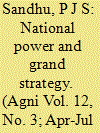

|
|
|
| 13 |
ID:
085455
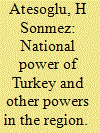

|
|
|
|
|
| Publication |
2008.
|
| Summary/Abstract |
This study examines the power of Turkey and other states in the region and provides a comparative assessment of their current national, military and economic power. For Turkey and the other top military powers, future developments in population, economic power, military power and national power were examined. Forecasts of population, economic, military and national power of these top military powers are presented.
|
|
|
|
|
|
|
|
|
|
|
|
|
|
|
|
| 14 |
ID:
139291
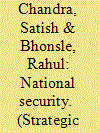

|
|
|
|
|
| Summary/Abstract |
The concept of national security has often been taken to merely connote the preservation of sovereignty, territorial integrity and internal stability with the focus on the coercive power of the state. In today’s complex and interdependent world faced with many non traditional threats like pandemics, climate change, etc it must, however, be seen in a more holistic manner. Such an all encompassing view of national security demands that the determinant of security is not just the coercive elements of state power but its comprehensive national power with the latter being a composite of many factors across all facets of national life. These factors, inclusive of leadership, if quantified, can help develop a national security index which in comparative terms could serve as an indicator of the relative security of a country vis a vis its peers. The holistic nature of national security demands that appropriate structures are in place to manage it. India is fortunate to have such structures which, of course, need revitalisation.
|
|
|
|
|
|
|
|
|
|
|
|
|
|
|
|
| 15 |
ID:
052173
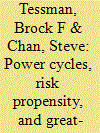

|
|
|
|
|
| Publication |
April 2004.
|
| Summary/Abstract |
The theory of power cycles contends that the growth and decline of national power holds the key to understanding the occurrence of extensive wars. Certain critical points in a state's power trajectory are especially dangerous occasions for such armed clashes. The power cycles of nine major states during the period from 1816 to 1995 are examined, and prospect theory is used to derive expectations about the risk propensity of states during different periods in their power cycle. These expectations are in turn applied to an analysis of deterrence encounters among the major states. Results show that critical points tend to incline states to initiate deterrence confrontations and escalate them to war. Democratic states, however, are less susceptible to these tendencies than authoritarian ones. Results also show that changes in power trajectories do affect the occurrence and outcome of deterrence encounters among the great powers.
|
|
|
|
|
|
|
|
|
|
|
|
|
|
|
|
| 16 |
ID:
170650
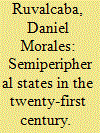

|
|
|
|
|
| Summary/Abstract |
The notion of semiperiphery refers to specific, delimited, observable and geographically referenced spaces: the semiperipheries fulfil a complex structural function and are not common in the world system. In this way, what countries have transited through these ascending/descending mobilities and now make up the semiperiphery? This article not only presents an extensive theoretical review of the concept of semiperiphery but also demonstrates the coexistence of two groups of states in the semiperiphery: the first, the high or strong, semiperiphery, is composed of the so-called regional powers; the second, the low or weak, semiperiphery, is made up of a group that has been little studied so far and that can be named as secondary regional states. Due to an increase in their material and immaterial capacities, the regional powers entered into a dynamic of rise in the first decade of the twenty-first century and, with this, they strengthened their position in the international structure; secondary regional states did not stand out due to their emergence, but they significantly increased their semi-material capacities, which places them on the path of development. However, none of the cases have overcome their situation and semiperipheral nature.
|
|
|
|
|
|
|
|
|
|
|
|
|
|
|
|
| 17 |
ID:
151973
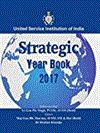

|
|
|
|
|
| Publication |
New Delhi, Vij Books India Pvt Ltd, 2017.
|
| Description |
xv, 215p.hbk
|
| Standard Number |
9789386457141
|
|
|
|
|
|
|
|
|
|
|
|
Copies: C:1/I:0,R:1,Q:0
Circulation
| Accession# | Call# | Current Location | Status | Policy | Location |
| 058987 | 355.0205/SHA 058987 | Main | On Shelf | Reference books | |
|
|
|
|
| 18 |
ID:
053188
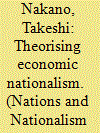

|
|
|
| 19 |
ID:
138998
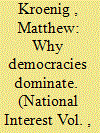

|
|
|
|
|
| Summary/Abstract |
CHINA’S ENORMOUS population and rapid rate of economic growth mean that Beijing could soon dislodge Washington from its standing as the most dominant power in Asia. The Economist, for example, predicts that China could overtake the United States as the world’s largest economy—an important measure of national power—in the year 2021. Moreover, we know that military might tends to follow economic heft. Beijing’s ongoing military buildup is already constraining America’s ability to project power in the Asia-Pacific region. If China follows Washington’s lead in investing in global power-projection capabilities, decades from now it could conceivably usurp global military supremacy from Washington.
|
|
|
|
|
|
|
|
|
|
|
|
|
|
|
|